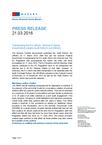Transposing the EU reform: German Federal Government adopts Audit Reform Act (AReG)
Transposing the EU reform
Mandatory auditor rotation
The AReG has far-reaching consequences for application in practice: A key element of the act is that it calls for a mandatory rotation of external auditors after ten years for public interest entities. This can be extended to a maximum of 20 years if a competitive and open tender is performed or to 24 years if an entity switches to a joint audit engagement. This does, however, not apply to credit institutions and insurance companies. These must rotate their auditors after ten years in future. The AReG closes a loophole in the provisions by adding an additional interim provision to the Introductory Act to the German Commercial Code (EGHGB) for a small number of public interest entities that had not had their auditors for eleven years at the time the EU Regulation went into effect but that will have had them for more than eleven years when the Regulation enters into force on 17 June 2016. The interim provision creates legal certainty to that effect as these entities may also extend the mandate of their auditors.
Provisions on auditing and advisory services at the same time
The AReG also dictates that auditing as well as consulting advisory services from the same company are permitted for all companies, though with a restriction for public interest entities. For these companies, advisory services related to taxes may not have an effect on the annual financial statement to be audited. A corresponding description is to be added to section 319a of the German Commercial Code that advisory services for public interest entities should not be permitted if the taxable profit would be reduced significantly or a significant portion of the profit would be moved offshore without this being of economic necessity for the company.
Additional information to the auditor’s report
Due to international and European regulations, the auditor’s report on the audit of public interest entities must, henceforth, contain additional information about particularly important auditing issues, the term of appointment and certain non-audit services.
“Having an active role in the creation of new players in the market”
With the audit reform, the EU is pursuing the principle of strengthening the independence of auditors and promoting the competitiveness of this market segment. New structures created by mergers could stir up the market. RBS Roever Broenner Susat and Mazars merged a year ago. “We took this step purposefully in order to have an active role in the creation of new players in the market. We want to use the opportunities that are available to us – and that’s exactly what we did with the merger,” said Dr Christoph Regierer, a partner at Roever Broenner Susat Mazars.
Joint audits: positive experiences in Frankreich
As a member of the international Mazars partnership that operates locations in 77 countries, joint audits are certainly not an unfamiliar new development for Roever Broenner Susat Mazars. Joint audits are mandated for listed corporations in France, where the Mazars Group is headquartered. “We have already had very positive experiences with this type of joint mandate. We know what joint audits mean for the company being audited and how it can profit from this,” said Pierre Zapp, also a partner at Roever Broenner Susat Mazars. “Two auditors that know the business activities of the company well represent the highest degree of flexibility for the company,” according to Pierre Zapp. “Joint audits are an opportunity – for the auditor and for the company being audited.”

